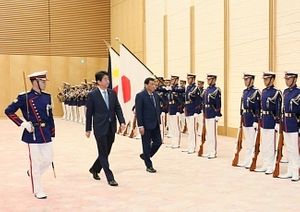This week, another report surfaced confirming that Japan had won a longstanding contract for the Philippines tied to boosting its radar capabilities. Though the report is in line with previous reporting we have seen, it nonetheless put the spotlight on a deal that would constitute a significant development not just for bilateral relationship but the wider region as well.
As I have observed before in these pages, defense relations between Japan and the Philippines have continued to advance in recent years despite the initial uncertainties posed by the rise of Philippine President Rodrigo Duterte. Collaboration is proceeding on several fronts, including capacity-building and transfers of military parts, amid wider developments like growing Chinese assertiveness and Japan’s own increasing regional security role under Prime Minister Shinzo Abe.
One of the potential deals that had been discussed in this context was Japan selling radar technology to the Philippines. Initial speculation about the Mitsubishi Electric FPS-3 air defense radar system being purchases for the Philippine Air Force publicly surfaced in 2018. As I noted when this was first floated, if realized, it would constitute a significant development since it would be the first full defense sale Japan would be making following the easing of its arms export ban and also another boost for Japan-Philippine defense ties.
Over the past few weeks, news has begun to surface about the deal being finalized after continued speculation. Indeed, earlier this month, The Philippine Daily Inquirer cited three anonymous senior government officials privy to the deal as confirming that Mitsubishi had been awarded the contract, with the notice of award issued on March 4 and contract signing set to take place potentially in 60 days.
This week, we saw another report surface suggesting that Mitsubishi had won the bid. The report, which appeared in Japan’s Asahi Shimbun, noted that Mitsubishi had won the bid to sell four air defense radar systems to the Philippines – three J/FPS-3 and one J/TPS-P14 air defense systems used by the Japan Self-Defense Forces. The report cited anonymous sources as saying that Mitsubishi had been notified of the selection in March after a successful bid resulting from “sales efforts made by the public-private partnership,” and that the company is expected to receive the formal order by May, for a total amount of about 10 billion yen ($90 million).
The report comes as no surprise – indeed, earlier speculation had suggested that we could see inroads on the deal as early as 2019. But as I noted earlier, it would not be without significance – for Japan’s regional security role, for the Japan-Philippines defense relationship, and for the Philippines’ own security capabilities.
With all indications suggesting that this is heading for a conclusion soon, one can expect that the focus will shift to the actual finalization procedures in the coming months and then how the two countries seek to operationalize it. Given the continued momentum we have seen in Japan-Philippines defense ties and the wider significance of this deal, one can expect the spotlight to continue to remain on it through the next part of 2020.
































